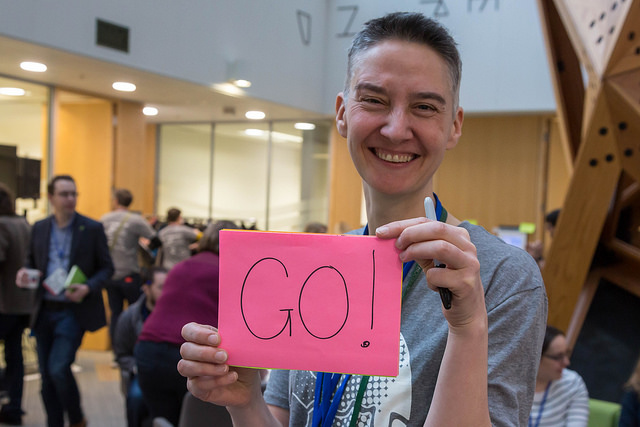Two thoughts and a plea: reflections on #AgileP
I spent the morning at Agile Procurement 1.0, a short unconference set up by @rachel0404 and @gogoagilegov. It was a fun morning, with lots of interesting people and good conversation. But, as often with these events, I left wondering what we can actually do to effect some change. @janethughes in her usual inimitable style left us with the challenge to do just that, so here goes.

Idea #1: Re-checking the market
The Digital Outcomes and Specialists framework encourages buyers to contract with suppliers based on the service manual phase that they’re at, and to re-procure when they reach the end of a phase.
This model is sensible, and has some important advantages:
- it encourages contracts to be small and focussed
- makes it easier to work with specialist suppliers who might be more suited to the current phase of the work
- gives regular opportunities to make sure the buyer’s still getting good value for money
As with anything, though, it has disadvantages too:
- having to re-procure at the end of a phase slows down delivery
- the cost of procurement is increased, because one project now requires 2-3 procurement processes
- having to re-procure when the buyer is happy with the supplier that they have is not sensible
It’s that last one that looms large for me. Requiring a buyer to go through a procurement process to re-award a contract to a supplier who’s doing a good job just doesn’t make sense. It’s slow, bureaucratic and expensive, and it elevates the process over the outcome. But it is important not to get locked into long contracts and bad deals.
I’d like to see the next version of DOS (or its successor) tackle this problem. The framework should contain a mechanism to check the market without going through a full procurement. I’d like to see a process, similar to pre-tender market engagement, where a buyer can brief the market on its work and ask for a 1-2 page submission explaining what they could do to help, and how much it would cost. Based on this, the buyer could then go to market, or decide to stick with their incumbent supplier.
I hope this would:
- reduce the number of pointless procurements where the outcome is almost certainly the re-appointment of the incumbent (wasting the other suppliers’ time in the process)
- give other supplier the opportunity to stay connected to potential clients and their work, and vice versa, mid-contract
- give buyers reassurance that they’re getting good value for money (or actionable information if they’re not!)
The option to go through a process like this would hopefully keep the advantages of phase-based reprocurements without incurring the costs of it.
Idea #2: Support for multi-supplier approaches
The public sector is pushing for disaggregation in contract delivery, and moving towards services being delivered by multiple suppliers. This is great: it gives buyers the ability to pick and choose the best suppliers for different parts of the service they’re delivering. The opposite approach, where one large company is contracted to deliver everything, has rightly fallen out of favour.
In practice, though, this is hard to achieve. Frameworks are not designed to work this way, and Digital Outcomes and Specialists is no exception: an opportunity cannot be awarded to more than one supplier. This makes a multi-supplier approach challenging. Ideally, there would just be separate procurements for each supplier as needed, but in practice, the process is too slow for that to be practical. Most of this is the fault of buyers’ internal processes rather than the framework but the upshot is the same.
The next solution is to award to a prime contractor who then subcontracts work to a consortium of suppliers. But this isn’t great either. It is, in fact, almost the same thing as awarding all the work to one company (the prime). It embeds the prime contractor into the work, making it impossible for the buyer to bring in another supplier without their involvement. And prime contractors don’t always behave responsibly. Large markups and preferential arrangements that allow the prime to keep all the best bits of the project have led to some justified scepticism in the approach.
Lacking any other solution, quite a few people have tried or are trying to set up rosters or benches where they contract with several suppliers and then award specific bits of work later. But it’s risky. This “framework within a framework” model flirts with illegality and is not very open: it excludes suppliers who don’t make it onto the roster. Ultimately, this is bad for suppliers and buyers alike. There must be a better way.
One way might be to allow buyers to award a single opportunity to more than one supplier. Opportunities could be explicit in seeking this outcome and written with bids from consortiums in mind. Or, buyers could be taken to a phase after the proposal stage to discuss whether there are good possibilities for collaboration. The framework is not far from being set up in this way anyway: all DOS contracts are call-offs, so in principle, awarding two call-off contracts in relation to a single opportunity doesn’t seem that outlandish.
In my experience, there’s also much more willingness from suppliers to cooperate than buyers expect: we discuss potential joint bids all the time. I believe strongly that as suppliers we have much more to gain from open, adult conversations about how to work together than we do from back-room scheming and aggressive competition.
Plea: these events need new faces in the room
I’ll talk about procurement to anyone who wants to listen. I know that most people don’t find it terribly interesting, but I think it’s vital that we find better to do it. And all conversations about vital things are interesting.
But over the last few years, it’s become clear that I am, in fact, in a club of like-minded people. It’s a small club. But it definitely exists. And its members are the people who turn up to events like this one.
All of the people in this club are wonderful and interesting people. But we need more jobbing digital delivery and procurement teams in the room. More of the people who are actually buying and delivering things. More people responsible for commercial risk in public sector bodies. More people responsible for delivering services. More people who write the business cases and opportunities and evaluate the bids. The users. We need the users.
So: what can we do to help that happen?
How do we take this conversation beyond words and into action?
